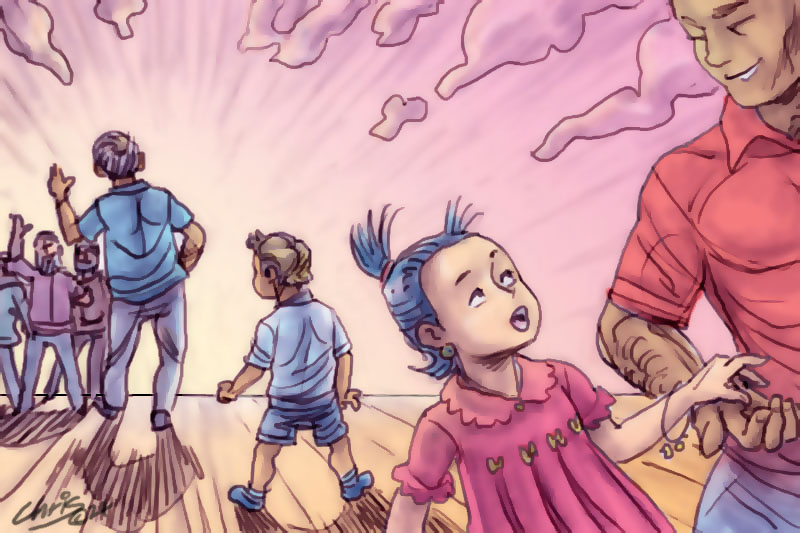Over the last few years, we’ve been witnessing a Fatherhood revolution. More and more we see the positive and nuanced role of dads displayed in popular culture. On TV through the success of Bluey starring Bluey’s and Bingo’s dad Bandit, on entertaining podcasts like Hamish Blake’s ‘How Other Dads Dad’, and through inspirational books such as Thomas Mayo’s Dear Son: Letters and Reflections from First Nation’s Fathers. We see it all around us: with dads pushing prams, having fun at local playgrounds, or just showing their kids around Bunnings.

It's generally been a quiet revolution, one that’s been steadily growing for decades with more dads taking parental leave and caring for their kids while their partners are in paid work. It was ‘turbo charged’ by workplace changes during the Covid epidemic, which gave dads what they always wanted – more time at home with family. And you don’t see them wanting to give that away!
But here’s the problem: you won’t find this huge cultural shift reflected in the platforms of our mainstream political parties. Party policies cover everything that ‘opens and shuts’ but never mention dads. The mounting national research on fatherhood is helping us to understand these social changes: how to reach out to fathers, progress gender equality in parenting, improve the mental health of fathers and enhance the positive influence that fathers can have on their children. But you are unlikely to see these research findings cited in policy documents generated by government.
A recent example is the Federal report ‘Improving Outcomes for All’ prepared for State Education Ministers. The 250-page report makes no mention of the role of fathers in education, despite the research showing that dads have a unique and positive impact on their children’s progress at school.
Government reports on children in the Child Protection, Out of Home Care, Youth Homelessness and Youth Justice systems generally omit references to fathers. Social workers, childcare workers, youth workers, and teachers tell us that a positive relationship with a father gives kids an extraordinary ability to dodge the dangers that come their way. Yet discussion about the role of fathers and how they can be engaged in earlier intervention are rarely, if ever, referred to in policy documents.
Why no mention of fathers in public reports? Possibly an unfamiliarity with the fatherhood research? Or perhaps, a preferred use of generic terms like ‘parents’ which is laudably aimed at the inclusion of all family types. But which usually means that fathers remain invisible, and opportunities to support them in their role continue to be missed. What we see is a chasm between the fatherhood research and public policy – a disconnect between the aspirations of a new generation of fathers and our politicians.
'Nationally, better fathering was associated with marked declines in adolescent alcohol consumption, early sexual activity, teenage pregnancies, and smoking.'
National research bodies try to bridge this chasm by showcasing the innovative work taking place in Australia. Just last year thirty fresh research studies were presented at the Australian Fatherhood Research Symposium at Deakin University. Researchers covered such vital topics as the inclusion of fathers before and after birth, rebuilding child and father relationships, dads supporting mums, and culturally diverse fathers. Research bodies also endeavour to prove the worth of father-focussed initiatives, for instance by piloting ways to reach out to busy dads with schemes like SMS4 dads.
Australia is not alone. The renowned Fatherhood Institute in the United Kingdom, frustrated by a similar lack of government policy, has adopted a new approach to get authorities to listen. Their publication ‘The Kids are Alright,’ reviews 188 longitudinal reports showing the influence that fathering during childhood has on their children’s development through to adolescence.
Their research dispels the myth that Western societies are ‘fatherless’. Even at age 17, national data indicates that 85 percent of young people in the UK are either living with or in contact with their birth father. The findings show that a father’s interest in his child’s education strongly predicts sons’ and daughters’ later qualifications in the most disadvantaged families, and a father’s depression in an infant’s first year is associated with higher child depression scores for children aged 9-11.
Nationally, better fathering was associated with marked declines in adolescent alcohol consumption, early sexual activity, teenage pregnancies, and smoking. Perhaps surprisingly, ‘proven offences’ by 10–17-year-olds in England and Wales dropped 81 per cent between 2012 and 2022. The report puts this down to better relations with fathers, with kids feeling it’s okay to be at home and therefore not getting into trouble with their peers.
This review of quality research draws strong links between positive fathering and adolescent wellbeing. And conversely, poorer adolescent life outcomes where there is conflict and a disconnect with fathers.
In all this, a new and positive narrative is emerging that better outcomes for families will follow once governments embrace the growing fatherhood research and put in place policies that support dads and their parenting.
Mike Kelly is a former CEO of a youth and family agency, social worker, and father.
Main image: Chris Johnston illustration.